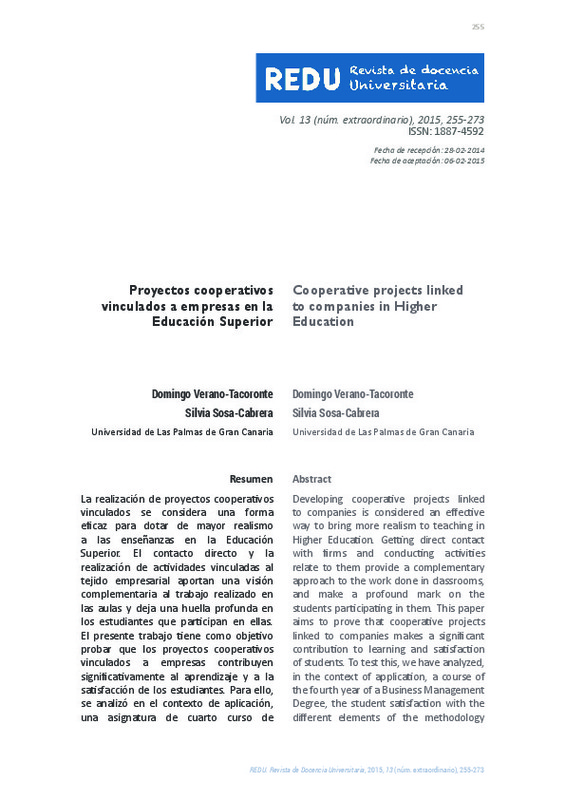Alonso Martín, P. (2007). Evaluación formativa y su repercusión en el clima del aula. Revista de Investigación Educativa, 25(2), 389-402.
Álvarez González, S., Inda Caro, M.M., Álvarez Rubio, M.R. (2012). El trabajo cooperativo y la triple evaluación dinamizan la ense-anza-aprendizaje de una lengua extranjera. Revista de Investigación en Educación, 10(1), 76-87.
Andrade, H. (2005). Teaching with rubrics: the good, the bad and the ugly. College Teaching, 53(1), 27-30. https://doi.org/10.3200/CTCH.53.1.27-31
[+]
Alonso Martín, P. (2007). Evaluación formativa y su repercusión en el clima del aula. Revista de Investigación Educativa, 25(2), 389-402.
Álvarez González, S., Inda Caro, M.M., Álvarez Rubio, M.R. (2012). El trabajo cooperativo y la triple evaluación dinamizan la ense-anza-aprendizaje de una lengua extranjera. Revista de Investigación en Educación, 10(1), 76-87.
Andrade, H. (2005). Teaching with rubrics: the good, the bad and the ugly. College Teaching, 53(1), 27-30. https://doi.org/10.3200/CTCH.53.1.27-31
Andrade, H., Du, Y. (2005). Student perspectives on rubric-referenced assessment. Practical Assessment, Research & Evaluation,10(3), disponible en http://PAREonline.net/getvn.asp?v=10&n=3.
Armstrong, S.J., Fukami, C.V. (2009). Past, present and future perspectives of management learning, education and development. En Armstrong, S.J. y Fukami, C.V. (Eds.) The Sage Handbook of Management Learning, Education and Development, pp. 1-22.Sage: Londres. https://doi.org/10.4135/9780857021038.n1
Baarmant, L., Prins, F., Kirchner, P., Van Der Vleuten, C. (2007). Determining the quality of competence assessment programs: a self-evaluation procedure. Studies in Educational Evaluation, 33, 258-281. https://doi.org/10.1016/j.stueduc.2007.07.004
Berné Manero, C., Lozano Chavarría, P., Marzo Navarro, M. (2011). Innovación en la docencia universitaria a través de la metodología MTD. Revista de Educación, 355 (Mayo-Agosto), 605-619.
Birenbaum, M. (1996). Assessment 2000: towards a pluralistic approach to assessment. En M. Birenbaum y FJR Dochy (Eds.), Alternatives in assessment of achievements, learning processes and prior knowledge, pp. 3-29. Kluwer Academic Publisher: Boston. https://doi.org/10.1007/978-94-011-0657-3_1
Blumenfeld, P., Soloway, E., Marx, R. (1991). Motivating project-based learning: sustaining the doing, supporting the learning. Educational Psychologist, 26, 369-398. https://doi.org/10.1080/00461520.1991.9653139
Bolívar-Cruz, A., Dávila-Cárdenes, N., Fernández-Monroy, M., Galván-Sánchez, I., González-Betancor, S., López-Puig, A., Suárez-Falcón, H., Verano-Tacoronte, D., Dorta-González, P. (2013). Evaluación y fomento de la competencia de comunicación oral de los estudiantes universitarios. Revista Iberoamericana de Evaluación Educativa,6(1), 17-28.
Bolívar-Cruz, A., Verano-Tacoronte, D., González-Betancor, S.M. (2015). Is University Students' Self-Assessment Accurate? In Sustainable Learning in Higher Education, pp. 21-35. Springer International Publishing.
Boud, D. (2006). Aren't we all learner-centered now? The bittersweet flavour of success. En Ashwin, P. (Ed.) Changing higher education: the development of learning and teaching, pp. 19-32. Routledge: London.
Boud, D., Costley, C. (2007). From project supervision to advising: new conceptions of the practice. Innovations in Education and Teaching International, 44(2), 119-130. https://doi.org/10.1080/14703290701241034
Brodie, P.E., Irving, K. (2007). Assessment in work-based learning: investigating a pedagogical approach to enhance student learning. Assessment & Evaluation in Higher Education, 32(1), 11-19. https://doi.org/10.1080/02602930600848218
Comisión Europea (2004).Competencias clave para un aprendizaje a lo largo de la vida. Dirección General de Educación y Cultura: Madrid.
Cortina, J.M. (1993). What is coefficient alpha? An examination of theory and applications. Journal of Applied Psychology,78, 98-104. https://doi.org/10.1037/0021-9010.78.1.98
Costley, C. (2007). Work-based learning: assessment and evaluation in higher education. Asesssment & Evaluation in Higher Education, 32(1), 1-9. https://doi.org/10.1080/02602930600848184
Defillippi y Milter, R. (2009). Problem-based and project-based learning approaches: applying knowledge to authentic situations. En Armstrong, S.J. y Fukami, C. [eds], The Sage Handbook of Management learning, education and development, pp. 344-363. SAGE Publications: Londres. https://doi.org/10.4135/9780857021038.n18
Dillenbourg, P. (1999). What do you mean by collaborative learning? En Dillembourg, P. (ed) Collaborative-learning: cognitive and computational approaches, pp. 1-19. Elsevier: Oxford.
Fernández-March, A. (2010). La evaluación orientada al aprendizaje en un modelo de formación por competencias en la educación universitaria. REDU - Revista de Docencia Universitaria, 8(1), 11-34.
Goodnough, K. (2006). Enhancing pedagogical content through self-study: an exploration of problem-based learning. Teaching in Higher Education, 11(3), 301-318. https://doi.org/10.1080/13562510600680715
Gülbahar, Y., Tinmaz, H. (2006). Implementing project-based learning and e-portfolio assessment in an undergraduate course. Journal of Research on Technology in Education, 38(3), 309-327. https://doi.org/10.1080/15391523.2006.10782462
Ibarra Sáiz, M., Rodríguez Gómez, G., Gómez Ruíz, M. (2012). La evaluación entre iguales: beneficios y estrategias para su práctica en la Universidad. Revista de Educación, 359, 206-231.
Lester, S., Costley, C. (2010). Work-based learning at higher education level: value, practice and critique. Studies in Higher Education, 35(5), 561-575. https://doi.org/10.1080/03075070903216635
Mertler, C. A. (2001). Designing scoring rubrics for your classroom. Practical Assesment Research and Evaluation, 7(25), disponible en http://PAREonline.net/getvn.asp?v=7&n=25.
Navarro Soria, I., González Gómez, C. (2010). La autoevaluación y la evaluación entre iguales como estrategia para el desarrollo de competencias profesionales. Una experiencia docente en el Grado de Maestro. REDU - Revista de Docencia Universitaria, 8(1), 187-200.
Ramos-Álvarez, M.M., Luque, G. (2010). A competence-based constructivist tool for evaluation. Cultura y Educación, 22(3), 329-344. https://doi.org/10.1174/113564010804932148
Ravitz, J. (2009). Introduction: Summarizing Findings and Looking Ahead to a New Generation of PBL Research. Interdisciplinary Journal of Problem-based Learning, 3(1). Disponible en https://doi.org/10.7771/1541-5015.1088
Reinsch, N.L. Jr., Shelby, A.N. (1997). What communication abilities do practitioners need? Evidence from MBA students. Business Communication Quarterly, 60(4), 7-29. https://doi.org/10.1177/108056999706000401
Ribeiro, L., Camargo, R., Mizukami, M., Nicoletti, G. (2005). Student assessment of a problem based learning experiment in civil engineering education. Journal of Professional Issues in Engineering Education and Practice, 131(1), 13-18. https://doi.org/10.1061/(ASCE)1052-3928(2005)131:1(13)
Rodríguez Esteban, A., Vieira Aller, M.J. (2009). La formación en competencias en la universidad: un estudio empírico sobre su tipología. Revista de Investigación Educativa, 27(1), 27-47.
Segers, M., Dochy, F. (2001). New assessment forms in problem-based learning: the value-added of the students' perspective. Studies in Higher Education, 26(3), 327-343. https://doi.org/10.1080/03075070120076291
Serrano González-Tejero, J.M., Pons Parra, R.M. (2011). El constructivismo hoy: enfoques constructivistas en educación. Revista Electrónica de Investigación Educativa, 13(1), accesible en http://redie.uabc.mx/vol13no1/contenido-serranopons.html.
Solaz-Portolés, J.J., Sanjosé-López, V., Gómez-López, A. (2011). Aprendizaje basado en problemas en la Educación Superior: una metodología necesaria en la formación del profesorado. Didáctica de las Ciencias Experimentales y Sociales, 25, 177-186.
Thomas, J. (2000). A review of research on project-based learning, Buck Institute for Education, disponible en http://www.bobpearlman.org/BestPractices/PBL_Research.pdf.
Wertsch, J.V. (1991). Voices of the mind: a sociocultural approach to mediate action. Harvard University Press: Cambrigde, MA.
[-]








